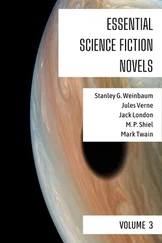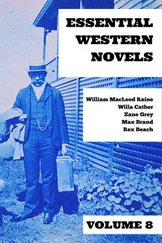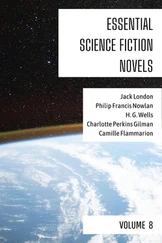Bondy found this scene very pleasant and touching.
“I’ll send my secretary to Marek,” he resolved; “to-morrow without fail. And what shall I do to-day? It’s a holiday; I’m not going to the works. My time’s my own . . . a wretched state things are in! Nothing to do all day long! Suppose I went round to-day myself.”
G. H. Bondy hesitated. It would be a bit of an adventure to go and see for oneself how that queer fellow was struggling along in Břevnov.
“After all, we were such chums! And old times have their claim on one. Yes, I’ll go!” decided Mr. Bondy. And he went.
He had rather a boring time while his car was gliding all over Břevnov in search of a mean hovel bearing the number 1651. They had to inquire at the police-station.
“Marek, Marek,” said the inspector, searching his memory. “That must be Marek the engineer, of Marek and Co., the electric lamp factory, 1651, Mixa Street.”
The electric lamp factory! Bondy felt disappointed, even annoyed. Rudy Marek wasn’t living up in a garret, then! He was a manufacturer and wanted to sell some invention or other “for personal reasons.” If that didn’t smell of bankruptcy, his name wasn’t Bondy.
“Do you happen to know how Mr. Marek is doing?” he asked the police inspector, with a casual air, as he took his seat in the car.
“Oh, splendidly!” the inspector answered. “He’s got a very fine business.” Local pride made him add, “The firm’s very well known”; and he amplified this with: “A very wealthy man, and a learned one, too. He does nothing but make experiments.”
“Mixa Street!” cried Bondy to his chauffeur.
“Third on the right!” the inspector called after the car.
Bondy was soon ringing at the residential part of quite a pretty little factory.
“It’s all very nice and clean here,” he remarked to himself. “Flower-beds in the yard, creeper on the walls. Humph! There always was a touch of the philanthropist and reformer about that confounded Marek.” And at that moment Marek himself came out on the steps to meet him; Rudy Marek, awfully thin and serious-looking, up in the clouds, so to speak. It gave Bondy a queer pang to find him neither so young as he used to be nor so unkempt as that inventor; so utterly different from what Bondy had imagined that he was scarcely recognizable. But before he could fully realize his disillusionment, Marek stretched out his hand and said quietly, “Well, so you’ve come at last, Bondy! I’ve been expecting you!”
THE KARBURATOR
“I’ve been expecting you!” Marek repeated, when he had seated his guest in a comfortable leather chair. Nothing on earth would have induced Bondy to own up to his vision of the fallen inventor. “Just fancy!” he said, with a rather forced gaiety. “What a coincidence! It struck me only this very morning that we hadn’t seen one another for twenty years. Twenty years, Rudy, think of it!”
“Hm,” said Marek. “And so you want to buy my invention.”
“Buy it?” said G. H. Bondy hesitatingly. “I really don’t know . . . I haven’t even given it a thought. I wanted to see you and——”
“Oh, come, you needn’t pretend,” Marek interrupted him. “I knew that you were coming. You’d be sure to, for a thing like this. This kind of invention is just in your line. There’s a lot to be done with it.” He made an eloquent motion with his hand, coughed, and began again more deliberately. “The invention I am going to show you means a bigger revolution in technical methods than Watt’s invention of the steam-engine. To give you its nature briefly, it provides, putting it theoretically, for the complete utilization of atomic energy .”
Bondy concealed a yawn. “But tell me, what have you been doing all these twenty years?”
Marek glanced at him with some surprise.
“Modern science teaches that all matter—that is to say, its atoms—is composed of a vast number of units of energy. An atom is in reality a collection of electrons, i.e. of the tiniest particles of electricity.”
“That’s tremendously interesting,” Bondy broke in. “I was always weak in physics, you know. But you’re not looking well, Marek. By the way, how did you happen to come by this playth . . . this, er . . . factory?”
“I? Oh, quite by accident. I invented a new kind of filament for electric bulbs. . . . But that’s nothing; I only came upon it incidentally. You see, for twenty years I’ve been working on the combustion of matter. Tell me yourself, Bondy, what is the greatest problem of modern industry?”
“Doing business,” said Bondy. “And are you married yet?”
“I’m a widower,” answered Marek, leaping up excitedly. “No, business has nothing to do with it, I tell you. It’s combustion. The complete utilization of the heat-energy contained in matter! Just consider that we use hardly one hundred-thousandth of the heat that there is in coal, and that could be extracted from it! Do you realize that?”
“Yes, coal is terribly dear!” said Mr. Bondy sapiently.
Marek sat down and cried disgustedly, “Look here, if you haven’t come here about my Karburator, Bondy, you can go.”
“Go ahead, then,” Bondy returned, anxious to conciliate him.
Marek rested his head in his hands, and after a struggle came out with, “For twenty years I’ve been working on it, and now—now, I’ll sell it to the first man who comes along! My magnificent dream! The greatest invention of all the ages! Seriously, Bondy, I tell you, it’s something really amazing.”
“No doubt, in the present wretched state of affairs,” assented Bondy.
“No, without any qualification at all, amazing. Do you realize that it means the utilization of atomic energy without any residue whatever?”
“Aha,” said Bondy. “So we’re going to do our heating with atoms. Well, why not? . . . You’ve got a nice place here, Rudy. Small and pleasant. How many hands do you employ?”
Marek took no notice. “You know,” he said thoughtfully, “it’s all the same thing, whatever you call it—the utilization of atomic energy, or the complete combustion of matter, or the disintegration of matter. You can call it what you please.”
“I’m in favour of ‘combustion’!” said Mr. Bondy. “It sounds more familiar.”
“But ‘disintegration’ is more exact—to break up the atoms into electrons, and harness the electrons and make them work. Do you understand that?”
“Perfectly,” Bondy assured him. “The point is to harness them!”
“Well, imagine, say, that there are two horses at the ends of a rope, pulling with all their might in opposite directions. Do you know what you have then?”
“Some kind of sport, I suppose,” suggested Mr. Bondy.
“No, a state of repose. The horses pull, but they stay where they are. And if you were to cut the rope——”
“—The horses would fall over,” cried G. H. Bondy, with a flash of inspiration.
“No, but they would start running; they would become energy released. Now, pay attention. Matter is a team in that very position. Cut the bonds that hold its electrons together, and they will . . .”
“Run loose!”
“Yes, but we can catch and harness them, don’t you see? Or put it to yourself this way: we burn a piece of coal, say, to produce heat. We do get a little heat from it, but we also get ashes, coal-gas, and soot. So we don’t lose the matter altogether, do we?”
“No.—Won’t you have a cigar?”
“No, I won’t.—But the matter which is left still contains a vast quantity of unused atomic energy. If we used up the whole of the atomic energy, we should use up the whole of the atoms. In short, the matter would vanish altogether .”
Читать дальше












